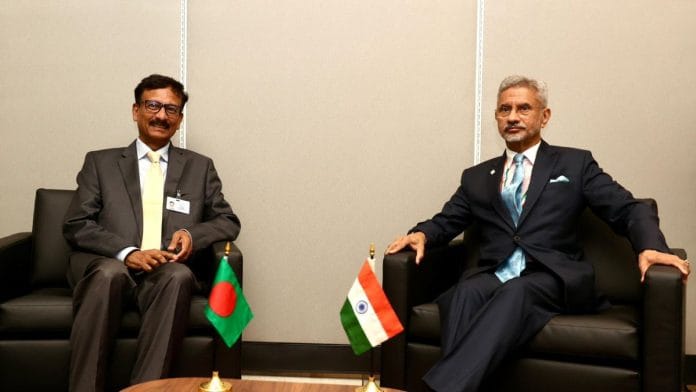New Delhi: External Affairs Minister S. Jaishankar urged Bangladesh to stop batting for Pakistan and normalising terrorism by pushing for the resumption of the activities of the South Asian Association for Regional Cooperation (SAARC), the Ministry of External Affairs (MEA) said Friday.
“Everyone in South Asia is aware of which country and what activities are responsible for stymieing SAARC. EAM conveyed that it is important that Bangladesh should not normalise terrorism,” MEA spokesperson Randhir Jaiswal said at a press briefing.
Bangladeshi Foreign Adviser Touhid Hossain sought Jaishankar’s support to revive SAARC during the meeting in Muscat on the margins of the Indian Ocean Conference last weekend.
In 2016, India boycotted the SAARC summit, scheduled to take place in Pakistan, following the terrorist attacks in Uri, Jammu and Kashmir. It received the support of Bangladesh and Afghanistan, leading to the cancellation of the summit.
Since then, the regional bloc has seen no formal activity. Membership to SAARC includes the countries of Afghanistan, Bangladesh, Bhutan, India, Maldives, Nepal, Pakistan and Sri Lanka.
New Delhi has since then promoted the Bay of Bengal Initiative for Multi-Sectoral Technical and Economic Cooperation (BIMSTEC), another regional grouping that does not have Pakistan as a member. Instead, Bangladesh, Bhutan, Myanmar, Nepal, Thailand, Sri Lanka, and Thailand are members.
Thailand is set to host the next BIMSTEC summit in April this year.
Also Read: Embassy reaches out to illegal Indian migrants deported to Panama as Trump steps up crackdown
Tense India-Bangladesh ties
The meeting between Jaishankar and Hossain was the second meeting between the two foreign ministers, following their first meeting on the margins of the United Nations General Assembly last September.
Ties between India and Bangladesh have frayed following the ouster of former Bangladeshi Prime Minister Sheikh Hasina in August 2024. Hasina fled to New Delhi from Dhaka and has remained in the Indian capital, as exclusively reported by ThePrint earlier.
For Bangladesh, the interim government led by Chief Adviser Muhammad Yunus is keen to reset ties with Islamabad following the change in regime in Dhaka. Hasina was perceived as close to New Delhi.
During a meeting between Yunus and Pakistani Prime Minister Shehbaz Sharif in the Egyptian capital of Cairo on the margins of the D-8 Organisation for Economic Cooperation (D-8) last December, the topic of the revival of SAARC was discussed by the two leaders.
Yunus has yet to meet Indian Prime Minister Narendra Modi. The two may meet for the first time on the margins of the BIMSTEC summit in Bangkok in April this year. However, for New Delhi, a number of concerns, including the protection of minorities, especially Hindus, in Bangladesh, remains a challenge with Dhaka.
Dhaka has consistently maintained that attacks against minorities since the ouster of Hasina have been fabricated by the media, particularly the Indian media.
Hasina’s activities in New Delhi, including recently making speeches to her supporters and party members, have rankled Dhaka. The office of the chief adviser earlier this month called on India to prevent any “potential instability” in Bangladesh due to Hasina’s speeches.
New Delhi has urged Dhaka to stop conflating Hasina with India in a strong rebuke last week while summoning its envoy. Bangladesh has sought Hasina’s extradition, handing over a note verbale in December 2024 to India.
Issues surrounding border security have also been another sore point between the two countries in recent months. However, so far, a number of dialogue mechanisms between both sides have continued.
Apart from Jaishankar’s two meetings with Hossain, Foreign Secretary Vikram Misri travelled to Dhaka for foreign office consultations last December. Between 17 February and 20 February, the Indian Border Security Forces (BSF) and Border Guards Bangladesh (BGB) held the 55th Director General (DG) level conference in New Delhi.
India lodges protest with Türkiye
Separately, New Delhi has lodged a strong protest with Türkiye following its President Recep Tayyip Erdogan’s comments on Jammu and Kashmir last week during a state visit to Pakistan.
“We reject such objectionable comments on matters which are internal to India. We have lodged a strong protest with the Turkish ambassador in New Delhi. Such unwarranted statements on India’s territorial integrity and sovereignty are unacceptable,” said Jaiswal Friday.
The MEA spokesperson added: “Instead of commenting on the internal affairs of another country, it would have been appropriate that Pakistan’s policy of using cross-border terrorism, which remains the biggest threat for the people of Jammu and Kashmir, had been called out.”
Erdogan visited Pakistan on 12-13 February. During his visit, the Turkish president suggested that the issue of Jammu and Kashmir should be solved bilaterally by India and Pakistan, keeping in mind the “aspirations of the Kashmiri people.” Erdogan further said Türkiye stands in “solidarity” with the Kashmiri people.
(Edited by Sanya Mathur)
Also Read: Pakistan’s ISI-led ‘spy racket’: NIA arrests 3 more contract employees at naval bases, tally now 8






